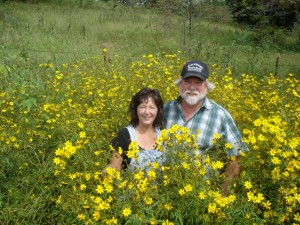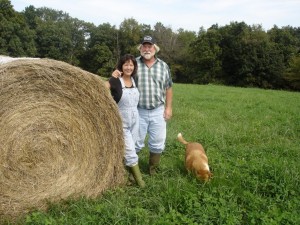Howard County, MO
Rhonda Perry and Roger Allison do more than raise cattle, soybeans and grains on their farm in Howard County, Missouri. They also raise awareness, working tirelessly as family farm advocates since the 1980s farm crisis. On top of tending their 850-acre farm, they run Missouri Rural Crisis Center and Patchwork Family Farms, both groups working to help family farmers thrive by advocating for fair policies and sustainable markets.
Their house sits a half a mile from the main road up a gravel drive. “You have to really know where you are going to find it,” said Rhonda. The farmhouse is on top of a hill and the view goes for miles with nothing but fields and wilderness. “This is a young man’s farm,” said Rhonda, referencing the energy required to tend the farm’s many rolling hills day after day. Regardless of how hard the climbing becomes, Roger says they will never leave.
“One of the things I love about our farm is thinking about the seasons,” said Roger, “how they all have their own challenges and they are all unique and beautiful.”
Rhonda and Roger’s farm is no stranger to challenges. During the farm crisis of the 1980s, the USDA looked to foreclose on the farm, which at the time just belonged to Roger. Roger refused to simply roll over, he chose to fight the administration instead.
“No one knew there was an appeals process,” he said, “[farmers] were just told they had thirty days to get off the land.”
In 1986, after a 145-day action protesting farm foreclosures at the USDA office in Chillicothe, Missouri, Rhonda’s parents and others joined as some of the first members of the Missouri Rural Crisis Center (MRCC), a group Roger helped to found a couple years earlier. As a statewide membership organization, the MRCC has worked to empower farmers and other rural people in the state ever since.
Farm Aid and the Missouri Rural Crisis Center have deep roots dating back to the founding of the MRCC. John Mellencamp arrived at the 1986 Chillicothe rally to show his support for the farmers against the USDA’s unfair lending practices. Ten years later in 1996, Willie Nelson marched with the MRCC and Missouri farmers in protest of factory farms. At the time, Premium Standard Farms, a flagship in confined animal feeding operations (CAFOs), had opened an industrial hog farm in the area.
The MRCC staged protests and involved the local community to rally against the factory farm. “In the 90s, we saw the writing on the walls,” said Rhonda. “If [our rallies] worked, others knew [theirs] could work too. Farm Aid stepped up to the plate and was really there for us,” said Rhonda.
“They took a stance on an issue that was still very controversial at the time.” And it paid off.
Premium Standard Farms was eventually forced to file for bankruptcy, in part because of the actions of the MRCC and concerned citizens. “What really helped was the farmers coming together, standing by each other,” said Roger, “fighting back against an unjust system.”
“We didn’t get here because corporations have a cheaper way of doing things,” said Rhonda. “We got here because policy was put in place that facilitated the growth of factory farms in the livestock industry.” This policy includes government-subsidized loans and the capital to start up new factory farms, even though the market is currently overflowing with excess industrial pork and chicken.
With the help of the Missouri Rural Crisis Center, farmers and community members continue to fight against factory farms everyday. “People are coming together to demand a different type of agriculture than what the industrial food systemis shoving down our throats,” said Roger. As people become more aware of where their food is coming from and how it is being treated, they are searching for more local and humanely raised options.
Patchwork Family Farms is there to provide these options. The 15 independent family hog farms involved in this cooperative raise sustainable pork with high standards, meaning no growth hormones, no sub-therapeutic use of antibiotics and plenty of access to the outside and fresh air. The USDA, EPA and Oxfam America have all recognized Patchwork Family Farms’ efforts to help the environment and sustain the traditions of rural communities. Since 2000, Patchwork Family Farms has sold their high quality pork products at the annual Farm Aid concerts across the country.
“We can have any type of agriculture in this country we want,” said Roger, “we just have to demand it.”
Both Rhonda and Roger stressed that they have come a long way and fought hard, but there is still much work to be done. Advocacy and activism are the best way to bring about change at the local and federal level. “Nobody is going to [stand up] for agriculture”, said Rhonda, “unless we build the organizations to challenge the power and push for change.”





